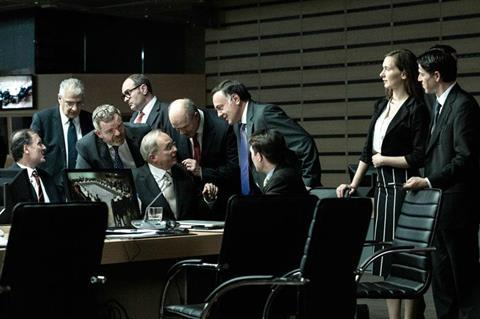
Investment in French cinema production came under pressure in 2019, mainly due to a fall in state and TV funding, according to the annual production report from France’s National Cinema Centre (CNC), which was published on Tuesday (March 31).
The long-running study covers all feature-length features granted CNC investment or production approval in a given year.
These approvals are required for producers to access the body’s different selective and automatic support schemes. Nearly all films qualify so this data is a good indication of the state of play within the French production scene.
This year’s 77-page report showed 301 films had been approved in 2019, up one from 2018. 240 were majority French productions and 61 were spearheaded by non-French producers, with French producers onboard as minority partners.
Overall investment for the 301 films stood at $1.2bn (€1.116bn), 0.8% lower than 2018.
Within this figure, overall investment in French majority productions was down 5.6% to $990m (€903m), against $1bn (€956.9m) in 2018. The CNC noted that investment in French majority productions had fallen an average of 2.3% a year since 2010.
Breaking down these figures further, the study showed that overall French investment had fallen by 7.2% in 2019 to $942.7m (€860.5m). Domestic investment in local cinema was down 7.6% to $899m (€820.9m).
In another sign of the financial pressure on the production sector, the CNC noted there had been an increase in the number of films with budgets under $4.5m (€4m), from 148 productions in 2018 to 161 in 2019.
There were no productions with budgets higher than $32m (€30m). In 2018, there two such productions, Jacques Audiard’s English-language western The Sisters Brothers and feature-length animation Asterix And The Magic Potion.
The data also showed that 70 of the films were first features, 54 were second features and the remaining 116 productions were the directors’ third feature or more.
Co-production culture remains robust
In other findings, the study showed that France’s strong co-production culture remains robust even if there were two fewer co-productions
The country’s producers were involved in 116 co-productions in 2019, representing 38.5% of all the approved films. Overall these films received $557m (€508.8m) worth of investment, representing an increase of 28.8% year-on-year for two fewer productions.
A total of 55 of these were majority French productions. Outside investment for these majority productions rose by 24.3% to $90m (€82.5m) year-on-year.
France’s biggest co-production partners by territory were Belgium with 34 joint productions, Germany with 14, Canada with five and Italy and Switzerland with four each, and then Lebanon and Tunisia with two each.
Funding squeeze
Breaking down the sources of funding for all the productions, the study revealed investment had edged down across a number of traditional sources of finance for cinema.
State funding from the CNC and regional bodies for all the films fell by 8.1% to $89.4m (€81.62m). Within this, CNC backing fell by 7.3% to $63.4 (€59.7m), while regional support fell by 10% to $24m (€21.9m).
Revenue from domestic theatrical and non-theatrical distribution deals as well as international sales was also under pressure, falling by 11% to $142.7m (€130.2m). Within this, revenue from video and TV library sales were particularly hard hit, falling by 77% year-on-year to $1m (€930,000) from $4.6m (€4.22m) in 2018. Foreign sales were down by 33.5% to $30m (€27.3m) year-on-year, against $45m (€41.2m) in 2018, according to the latest data available to the CNC.
Investment by broadcasters was also down by 3% overall to $299m (€273.4m) due to a 5.5 % fall in investment by pay-TV channels to $166m (€151.6m) in 160 approved films (four less than 2018). Free-to-air channels increased their spending slightly, by 0.3%, to $132m (€121m) in 108 features, eight less than in 2018.
The CNC cautioned that the broadcast data could differ slightly from figures collected by the broadcasters due to different accounting periods.
In a further sign, however, of how TV and cinema are diverging in France, the study noted 130 of the 2019 approved films, or 36.3%, had been made without the financial support of a broadcaster, the highest level in a decade.
This finding points to a changing landscape for film producers in France where television has traditionally played a big role in supporting cinema.
Gender statistics
The study also showed that 334 directors had been involved in the 301 productions, against 325 in 2018.
Within this, 254 were male, representing 76% of the total, and 80 were female, representing 24%. This was little changed from 2018 but an improvement on numbers a decade ago when women represented 18.7%, the CNC noted.
For the French majority productions, the percentage of female directors was slightly higher at 25.6%, against 22.1% in 2018.







![In a whisper[17].jpg](https://d1nslcd7m2225b.cloudfront.net/Pictures/274x183/0/2/3/1472023_inawhisper17.jpg_579998_crop.jpeg)











![In a whisper[17].jpg](https://d1nslcd7m2225b.cloudfront.net/Pictures/100x67/0/2/3/1472023_inawhisper17.jpg_579998_crop.jpeg)




No comments yet